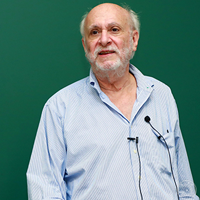
Asst. Prof. Xiaowu Dai
University of California, Los Angeles, USA
Title: Statistical Learning via Partial Derivatives
Biography: Dr. Dai is a tenure-track Assistant Professor at the
Department of Statistics and Data Science (primary) and the Department of Biostatistics
(secondary), UCLA. His research interest focuses on the area of economics and machine
learning, which blends game theory with online learning and provides statistical models
for mechanism design. Another area of focus is statistical machine learning, especially
in kernel-based learning, dynamical models, and uncertainty quantification, with
applications in biostatistics, including neuroimaging, diabetes, and kidney exchanges.

Prof. Kwun Chuen Gary Chan
University of Washington, USA
Biography: Professor Kwun Chuen Gary Chan is a Professor in the
Department of
Biostatistics at the University of Washington, with joint appointments in the Department
of Health Systems and Population Health and the Department of Statistics. He also serves
as the Associate Director of the National Alzheimer's Coordinating Center (NACC). Prof.
Chan's research focuses on developing statistical methods for complex study designs,
particularly in causal inference, survival analysis, and longitudinal data analysis. His
work spans both methodological innovations and collaborative projects in public health,
epidemiology, and aging research. He holds a Ph.D. in Biostatistics from Johns Hopkins
University and a Bachelor’s degree in Actuarial Science from the University of Hong
Kong.

Asst. Prof. Rui Duan
Harvard University, USA
Title: Efficient Collaborative Learning of the Average
Treatment Effect under Data Sharing Constraints
Biography: Rui Duan is an Assistant Professor of Biostatistics at the
Harvard T.H. Chan School of Public Health. She is also a primary faculty member at the
Department of Epidemiology and affiliated with the Harvard Data Science Initiative. She
received her Ph.D. in Biostatistics from the University of Pennsylvania in 2020 and
joined Harvard in the same year. Her research is supported by the Harvard Chan School of
Public Health Dean's Fund for Scientific Achievements, the Harvard Data Science
Initiative Competitive Research Fund, the Google Research Scholar Award, and the
National Institutes of Health.
Her research focuses on developing statistical and machine learning methods to
effectively utilize biomedical data to support precise diagnostics, individualized
treatments, and improved patient outcomes.

Prof. Erin Evelyn Gabriel
University of Copenhagen, Denmark
Title: Improved Inference for Symbolic Causal Bounds in
Small Samples
Biography: She is currently working on methodological research in the
areas of surrogate evaluation, particularly in the presence of interference and within
outcome-adaptive trials, nonparametric causal bounds, designs and estimation methods for
emulated and randomized clinical trials for the evaluation of prediction-based decision
rules. Her general statistical areas of interest are in causal inference and randomized
trials. She is also primarily interested in methods that are applicable to infectious
disease and vaccination, which is where much of her applied research has taken place,
but she also do work in other disease areas such as cancer and aging.
Abstract: Accounting for sampling variability in the estimation of
symbolic causal bounds has until recently been an afterthought. Recently there have been
a number of improved asymptotic methods, which only work under assumptions about the
underlying data generating mechanism and in large samples. I will outline a novel but
straightforward method for accounting for sampling variability that does not require
assumptions about the true data generating mechanism. I will demonstrate the method and
compare it to the bootstrap and the m-out-of-n bootstrap, which have both been suggested
previously in the literature. Finally, I will outline some next directions that could
improve estimation and inference, by restricting the parameter space by the known
observable constraints from the graph used to derive the bounds.

Asst. Prof. Zijun Gao
University of Southern California, USA
Title: Powerful Randomization Tests for Subgroup Analysis
Abstract: Randomization tests are widely used to generate valid
p-values for testing
sharp null hypotheses in finite-population causal inference. This article extends their
application to subgroup analysis. We show that directly testing subgroup null hypotheses
may lack power due to small subgroup sizes. Incorporating an estimator of the
conditional average treatment effect (CATE) can substantially improve power but requires
splitting the treatment variables between estimation and testing to preserve
finite-sample validity. To this end, we propose BaR-learner, a Bayesian extension of the
popular method R-learner [Robinson, 1988, Nie and Wager, 2021] for CATE estimation.
BaR-learner imputes the treatment variables reserved for randomization tests, reducing
information loss due to sample-splitting. Furthermore, we show that the treatment
variables most informative for training BaR-learner are different from those most
valuable for increasing test power. Motivated by this insight, we introduce AdaSplit, a
sample-splitting procedure that adaptively allocates units between estimation and
testing. Simulation studies demonstrate that our method yields more powerful
randomization tests than baselines that omit CATE estimation or rely on random
sample-splitting. We also apply our method to a blood pressure intervention trial,
identifying patient subgroups with significant treatment effects.

Dr. Wei Huang
The University of Melbourne, Australia
Title: Efficient Estimation of General Treatment Model by Balanced
Neural Networks Weighting
Biography: Dr Wei Huang, a Senior Lecturer in Statistics at the School
of Mathematics and Statistics, University of Melbourne. She is part of the Melbourne
Centre for Data Science and a Principal Investigator of the Causal Learning and
Reasoning Group. Her research interests lie in methodological and theoretical
statistics, especially in nonparametric statistics, causal inference, measurement errors
and functional data. She develops identification, estimation and statistical inference
for causal relationships from observational data in complex real-world scenarios,
including data measured with errors or repeatedly over continuous domains (functional
data, e.g. signals, images, shapes).
Abstract: Treatment effect inference from observational data is widely
used in
statistics and other sciences. A key condition for identifying causal effects is
unconfounded treatment assignment, which is more likely to hold when the confounder
dimension is high. We study efficient estimation and inference for a general treatment
model with high-dimensional confounders under this assumption. Our framework
accommodates binary, multi-valued, and continuous treatments, covering a broad range of
parameters, including average, quantile, distributional, and asymmetric least squares
treatment effects. We propose a Balanced Neural Networks (BNN) weighting method, which
leverages deep neural networks (DNNs) to handle high-dimensional covariates while
ensuring optimal covariate balance via empirical likelihood (EL) calibration. This
approach mitigates the "curse of dimensionality" and yields debiased, robust estimates.
Under regularity conditions, we establish the convergence rate of the estimated weights
and prove that our estimator is root-n asymptotically normal and achieves the
semiparametric efficiency bound. Additionally, we develop a weighted bootstrap procedure
for statistical inference without requiring efficient influence/score function
estimation. Simulations show that BNN consistently outperforms existing machine learning
methods, particularly in small samples. To illustrate its practical utility, we apply
BNN to two real datasets—the 401(k) data and the Mother's Significant Features (MSF)
data—demonstrating its effectiveness in estimating average and quantile treatment
effects for binary and continuous treatments, respectively.

Prof. Ying Huang
Fred Hutchinson Cancer Center and University of Washington, USA
Title: Advances in the Identification and Utilization of Principal
Surrogate Markers for
Vaccine Efficacy
Abstract: A central challenge in vaccine research is identifying and
validating
post-vaccination immune responses as reliable correlates of vaccine protection (CoPs).
Among existing statistical approaches, the principal surrogate vaccine efficacy
framework—grounded in principal stratification—is particularly effective in
characterizing biomarkers that strongly modify vaccine efficacy. This framework provides
a robust basis for comparing candidate vaccines and facilitating the translation of
vaccine efficacy findings to new populations or contexts. In this presentation, we
review key methodological challenges encountered in principal surrogate marker studies
and highlight recent statistical advancements. Emphasis will be placed on methods for
detecting threshold effects of immune responses and strategies for selecting and
integrating multiple immune correlates.
Biography: Dr. Huang is a Professor of Biostatistics in the Public
Health Sciences and
Vaccine & Infectious Diseases Divisions at the Fred Hutchinson Cancer Center, and an
Affiliate Professor in the Department of Biostatistics at the University of Washington.
Her research focuses on the development of statistical methods for the design and
analysis of biomarker studies, aimed at improving early disease detection, diagnostic
accuracy, treatment decision-making, and surrogate endpoint evaluation. Her work is
primarily motivated by applications in cancer and infectious diseases.

Mr. Remi Khellaf
Inria, France
Title: Federated Causal Inference: Multi-Studies ATE Estimation beyond
Meta-Analysis
Biography: Remi Khellaf is a PhD student in Machine Learning and
Statistics at Inria in the PreMEDiCal team, supervised by Julie Josse and Aurélien
Bellet. His research aims at developping Causal Inference methods for observational
studies in a Federated Learning setting.
Abstract: In modern evidence-based medicine, Randomized Controlled
Trials (RCT) are
considered the gold standard for estimating the Average Treatment Effect (ATE) because
they effectively isolate the treatment effect from confounding factors. The most widely
used estimator of the ATE, when expressed as a risk difference, is the
difference-in-means (DM) estimator. Recently, however, Health institutions have
recommended to adjust for covariates using linear models for the outcome, as this
approach consistently yields more precise ATE estimates than the DM estimator even when
the assumption of linearity does not hold. Nevertheless, concerns have been raised about
the limited scope of RCTs, including their stringent eligibility criteria, short
timeframes, limited sample size, etc. Consequently, regulatory agencies tasked with
making high-stakes decisions on drug approvals frequently turn to meta-analysis to guide
their choices. Meta-analysis, which aggregates estimated effects from multiple studies
conducted across various centers represents the pinnacle of evidence in clinical
research. They can lead to increased statistical power and more precise estimates, while
also offering valuable insights into rare adverse events. Despite extensive guidelines
on conducting meta-analyses, multi-studies approaches still face significant challenges.
These primarily arise from heterogeneity caused by imbalances in datasets, variations in
populations across studies, and center effects due to differing practices across
institutions. Moreover, simply aggregating local estimates is not the only approach to
conducting meta-analyses. However, implementing "one-stage'' meta-analyses that pool
individual patient data from all centers is practically challenging due to data silos
and personal data regulations.
Federated Causal Inference is an approach that allows to estimate treatment effects from
decentralized data across studies. We compare three classes of Average Treatment Effect
(ATE) estimators derived from the Plug-in G-Formula, ranging from simple meta-analysis
to one-shot and multi-shot federated learning, the latter leveraging the full data to
learn the outcome model (albeit requiring more communication). Focusing on Randomized
Controlled Trials (RCTs), we derive the asymptotic variance of these estimators for
linear models. Our results provide practical guidance on selecting the appropriate
estimator for various scenarios, including heterogeneity in sample sizes, covariate
distributions, treatment assignment schemes, and center effects. We validate these
findings with a simulation study.

Assoc. Prof. Chanmin Kim
SungKyunKwan University, Korea
Title: Bayesian Confounder Selection in Mediation Analysis
Biography: Chanmin Kim, an Associate Professor of Statistics at
SungKyunKwan University (SKKU, Seoul, Korea), is a statistician whose research interests
span Bayesian nonparametric/semiparametric methodologies, causal modelling, machine
learning, and their applications in health science, health policy evaluation, and air
pollution epidemiology. His reasearch also sits at the intersection of data science,
data visualization and efficient computation algorithm for Bayesian models. He has
extensive experience in handling/analyzing massive and scalable data such as
Medicare/Medicaid data, real-time air pollution and monitoring data in the US.
Abstract: Causal mediation analysis is critical for determining the
pathways through
which an exposure effects an outcome, as it divides the total effect into direct and
indirect effects. A key challenge in this setting is accurately identifying
confounders—particularly when dealing with high-dimensional data or unmeasured
variables—which, if ignored, may bias causal effect estimates. In this talk, we will
discuss a Bayesian nonparametric approach to confounder selection designed for causal
mediation research, which makes use of an enhanced version of Bayesian Additive
Regression Trees (BART). Our method uses sparsity-inducing priors to systematically
identify components that match a modified disjunctive cause criterion, guaranteeing
proper adjustment for variables that affect exposure, mediator, and outcome. We provide
theoretical guarantees for the consistency of confounder selection in high-dimensional
settings by demonstrating posterior concentration. Comprehensive simulation simulations
demonstrate that our approach outperforms conventional techniques, particularly in
correctly picking true confounders and precisely estimating both direct and indirect
effects. We illustrate the framework's practical applicability by analyzing real-world
data.

Mr. Haoxuan Li
Peking University, China
Title: Quantifying and Improving Causal Consistency of LLMs
Biography: He is a fourth-year Ph.D. candidate at Peking University,
where advised by Prof. Xiao-Hua Zhou, coadvised by Prof. Zhi Geng and Prof. Peng Cui.
Before that, he is selected into the 20th Experimental Class for Gifted Children in
Beijing No.8 Middle School, which enables me to finish all grade 6-12 course works in 4
years and entering university at the age of 15. He have more than 40 publications
appeared in several top conferences such as ICML, NeurIPS, ICLR, SIGKDD, WWW, SIGIR,
CVPR, AAAI, and IJCAI. His research interests span from causal machine learning theory,
counterfactual fairness, recommender system debiasing, out-of-distribution
generalization, and logical reasoning of large language models.

Mr. Ziming Lin
University of Washington, USA
Title: On the Consistency of Bootstrap for Matching Estimators
Biography: In a landmark paper, Abadie and Imbens (2008) showed that
the
naive bootstrap is
inconsistent when applied to nearest neighbor matching estimators of the average
treatment effect with a fixed number of matches. Since then, this result has prompted
numerous efforts to resolve the inconsistency, often through alternative bootstrap
methods. In contrast, our recent work shows that the naive bootstrap is provably
consistent for the original matching estimator, provided that the number of matches, M,
diverges. The inconsistency identified by Abadie and Imbens (2008) thus stems solely
from the assumption of a fixed M.
Abstract: Ziming Lin is a PhD student in Statistics at the University
of Washington,
advised by Dr. Fang Han. His research focuses on causal inference. Prior to UW, he
earned his undergraduate degree in Mathematics from Zhejiang University.

Asst. Prof. Kuan Liu
University of Toronto, Canada
Title: On Sensitivity Analysis for Time-Varying Unmeasured Confounding
Biography: Dr. Liu is an Assistant Professor of Health Services
Research at the Institute of Health Policy, Management and Evaluation, University of
Toronto, and hold a cross-appointment in the Division of Biostatistics at the Dalla Lana
School of Public Health. She hold a PhD in Biostatistics from the University of Toronto,
a MMath in Statistics-Biostatistics from the University of Waterloo, and a BSc Honours
in Statistics from the University of Alberta. Her research program focuses on advancing
the application of Bayesian methods in the design and analysis of longitudinal
observational studies and real-world clinical trials. This is achieved through the
development of novel methodologies, innovative application of statistical techniques,
and close collaboration with clinical and public health research scientists. Her
methodological interests include causal inference, applied Bayesian statistics,
longitudinal data analysis, measurement errors and bias analysis, as well as
semi-parametric and parametric joint modeling.

Assoc. Prof. Lin Liu
Shanghai Jiao Tong University, China
Title: On Computing and The complexity of Computing a Class of
Higher-order U/V-statistics, Exactly
Biography: Dr. Lin Liu is an Assistant Professor at the Institute of
Natural Sciences (INS) at Shanghai Jiao Tong University (SJTU). He also affiliated with
the School of Mathematical Sciences and the SJTU-YALE Joint Center for Biostatistics and
Data Science. He is also involved in research activities of the Smart Justice Lab of the
Koguan Law School at SJTU.

Asst. Prof. Junwei Lu
Harvard University, USA
Title: Ranking Inference for Human Feedback Tuning in Large Language
Models
Abstract: Human feedback tuning has been shown to effective to train
the large language
models (LLM). It allows the LLM understand the human feedback and preference. Despite
the extensive literature dealing with algorithms aligning the rank of human preference,
uncertainty quantification for the ranking estimation still needs to be explored and is
of great practical significance. For example, it is important to overcome the problem of
hallucination for LLM in the medical domain, and an inferential method for the ranking
of LLM answers becomes necessary. In this talk, we will present a novel inferential
framework for testing the ranking of human feedback and illustrate its application in
the language models for medical knowledges.

Dr. Yu Luo
Kings College London, UK
Title: Bayesian Causal Estimation via Loss Functions
Biography: Yu Luo obtained his PhD in biostatistics from McGill
University, Canada. His doctoral dissertation developed methods for non-equidistant,
longitudinal directories, especially under Bayesian settings, focusing on data found in
electronic health records, administrative data, and data derived from mobile
applications. After his doctoral study, he held positions in Imperial College London and
Lancaster University. In January 2023, Yu joined the Department of Mathematics, King’s
College London, as a Lecturer in Statistics.

Asst. Prof. Kosuke Morikawa
Iowa State University, USA
Title: Data integration with biased summary data via generalized
entropy balancing
Biography: Kosuke Morikawa is an Assistant Professor in the Department
of Statistics and a faculty member at the Center for Survey Statistics and Methodology
(CSSM) starting in 2024. His expertise spans semiparametric inference, missing data,
survey statistics, data integration, meta-analysis, model selection, and point
processes, with a particular focus on applications in geophysics. Actively engaged in
both theoretical research and practical applications, he has ongoing collaborations with
the Earthquake Research Institute at the University of Tokyo since 2018 and with the
Osaka University School of Medicine, extending his research to a wide array of fields.
His work integrates advanced statistical methods to address complex real-world problems,
underscoring his commitment to both theoretical and applied aspects of statistics.
Abstract: Statistical methods for integrating on-hand data with
existing summary data
from external sources have garnered significant attention. Effective utilization of
summary data can lead to more precise estimations, reducing both costs and time.
However, there is a risk of biased results due to potential differences in background
information between the current study and the external data. Employing a model-based
approach, which includes techniques such as mass imputation or balancing propensity
scores, may efficiently incorporate external information into internal individual data
while attempting to mitigate these biases. Nevertheless, the misspecification of models
can still result in biased outcomes. We propose a model-free approach that facilitates
the integration of potentially biased summary data by balancing the two distributions
without the need for additional models typically associated with regression or
propensity score methods. Our proposed estimator can pursue efficiency with the
additional information from the external data while maintaining consistency. We
demonstrate the versatility of our estimator by applying it to the analysis of
Nationwide Public-Access Defibrillation data in Japan.

Prof. Ryo Okui
University of Tokyo, Japan
Title: Uniform Confidence Band for Marginal Treatment Effect Function
Biography: Dr. Ryo Okui is currectly a professor at Graduate School of
Economics, University of Tokyo, Japan. His research interest is panel data analysis. He
is interested in statistical methods to understand heterogeneity across economic units
using panel data. He study statistical methods to obtain the distribution of
characteristics across units in panel data, and procedures to cluster units according to
the value of characteristics. He is currently working on methods to investigate
time-varying heterogeneity, the development of inference methods, and the comparison
across different statistical methods. He also conduct economic experiments and applied
research.
Abstract: This paper presents a method for constructing uniform
confidence bands for the
marginal treatment effect function. Our approach visualizes statistical uncertainty,
facilitating inferences about the function’s shape. We derive a Gaussian approximation
for a local quadratic estimator, enabling computationally inexpensive construction of
these bands. Monte Carlo simulations demonstrate that our bands provide the desired
coverage and are less conservative than those based on the Gumbel approximation. An
empirical illustration is included.

Asst. Prof. Shunichiro Orihara
Tokyo Medical University, Japan
Title: Robust estimation and model selection for the controlled
directed effect with unmeasured mediator-outcome confounders
Biography: Currently, he is interested in developing statistical
methodologies related to the problem of unmeasured confounders and propensity score
analysis. Unmeasured confounder problems commonly occur in observational studies. He is
particularly interested in developing statistical methods for time-to-event outcomes.
When there are issues with unmeasured confounders, instrumental variable (IV) methods
are commonly applied. In the fields of biometrics and medical research, Mendelian
randomization (MR), which uses single nucleotide polymorphisms (SNPs) as IVs, is
sometimes applied. In MR, valid IV selection and overcoming weak IV problems are crucial
processes for accurately estimating causal effects. He is interested in addressing these
challenges.
Abstract: Controlled Direct Effect (CDE) is one of the causal estimands
used to evaluate both exposure and mediation effects on an outcome. When there are
unmeasured confounders existing between the mediator and the outcome, the ordinary
identification assumption does not work. In this manuscript, we consider an
identification condition to identify CDE in the presence of unmeasured confounders. The
key assumptions are: 1) the random allocation of the exposure, and 2) the existence of
instrumental variables directly related to the mediator. Under these conditions, we
propose a novel doubly robust estimation method, which work well if either the
propensity score model or the baseline outcome model is correctly specified.
Additionally, we propose a Generalized Information Criterion (GIC)-based model selection
criterion for CDE that ensures model selection consistency. Our proposed procedure and
related methods are applied to both simulation and real datasets to confirm the
performance of these methods. Our proposed method can select the correct model with high
probability and accurately estimate CDE.

Prof. James M. Robins
Harvard Chan, Harvard University, USA
Title: Higher order influence functions and the minimaxity and
admissibility of double machine learning (DML) estimators under minimal assumptions
Biography: James M. Robins is an epidemiologist and biostatistician
best known for advancing methods for drawing causal inferences from complex
observational studies and randomized trials, particularly those in which the treatment
varies with time. He is the 2013 recipient of the Nathan Mantel Award for lifetime
achievement in statistics and epidemiology, and a recipient of the 2022 Rousseeuw Prize
in Statistics, jointly with Miguel Hernán, Eric Tchetgen-Tchetgen, Andrea Rotnitzky and
Thomas Richardson. He graduated in medicine from Washington University in St. Louis in
1976. He is currently Mitchell L. and Robin LaFoley Dong Professor of Epidemiology at
Harvard T.H. Chan School of Public Health. He has published over 100 papers in academic
journals and is an ISI highly cited researcher.
Abstract: For many functionals that arise in causal inference, DML
estimators are the
state-of-the-art, incorporating the good predictive performance of black-box machine
learning algorithms; the decreased bias of doubly robust estimators; and the analytic
tractability and bias reduction of sample splitting with cross fitting. Recently
Balakrishnan, Wasserman and Kennedy (BWK) introduced a novel assumption-lean model that
formalizes the problem of functional estimation when no complexity reducing assumptions
(such as smoothness or sparsity) are imposed on the nuisance functions occurring in the
functional’s first order influence function (IF1). Then, for the integrated squared
density and the expected conditional variance functionals, they showed that first-order
estimators, which include DML estimators, based on IF1 are rate minimax under squared
error loss.
However, earlier Liu, Mukherjee, and Robins (2020) had shown that, for these
functionals, higher-order influence function (HOIF) based estimators (ie estimators that
add a debiasing mth-order U-statistic to a first -order estimator) could have smaller
risk (mean squared error) than the first order estimator. In this talk, I resolve this
apparent paradox. I show that, although minimax, DML estimators of these functionals
are (asymptotically) inadmissible under the BWK model because the risk of any
first-order estimator is never less than that of the corresponding HOIF estimator and,
under many laws, may be much greater.
As a consequence, under many data generating laws, HOIF estimators can be used to show
that actual coverage of nominal 1-alpha Wald confidence intervals centered at a DML
estimator is less than nominal.

Prof. Donald B. Rubin
Harvard University, USA
Title: The Increasing Relevance of Principal Stratification to Define
Causal Inference Estimands
Biography: Professor Rubin joins Yau Mathematical Sciences Center,
Tsinghua University from Harvard University, where he was the John L. Loeb Professor of
Statistics. He has served on Harvard’s faculty as full professor of Statistics since
1983, chairing its Department of Statistics for 13 of those years. He is most well-known
for the Rubin Causal Model, a set of methods designed for causal inference with
observational data, and for his methods for dealing with missing data.
Abstract: The CACE, the complier average causal effect, is an early
example of a causal estimand whose definition was clarified using principal
stratification to generalize the econometric concept of instrumental variables, a
formulation which is based on ordinary least squares; the CACE example stratified
population units into compliers, defiers, never-takers and always-takers. Recent work
has revealed how principal stratification can be analogously applied to contexts well
beyond the setting of noncompliance. We review these recent extensions and consider
further examples of practical relevance.

Dr. Xinwei Shen
ETH Zurich, Switzerland
Title: Distributional Instrumental Variable Method
Biography: Dr. Xinwei Shen is a postdoctoral researcher at the Seminar
for Statistics, ETH Zürich, working with professors Peter Bühlmann and Nicolai
Meinshausen. Previously, she obtained my PhD in the Department of Mathematics at Hong
Kong University of Science and Technology in 2022, supervised by professor Tong Zhang.
She obtained a Bachelor of Science degree at Fudan University in 2018. Her research
interests lie at the interface of statistics and machine learning. Her current research
focuses on distributional learning, causality, robustness, as well as climate
applications.
Abstract:The instrumental variable (IV) approach is commonly used to
infer causal effects in the presence of unmeasured confounding. Existing methods
typically aim to estimate the mean causal effects, whereas a few other methods focus on
quantile treatment effects. The aim of this work is to estimate the entire
interventional distribution, which yields the classical causal estimands as functionals.
We propose a method called Distributional Instrumental Variable (DIV), which uses
generative modelling in a nonlinear IV setting. We establish identifiability of the
interventional distribution under general assumptions and demonstrate an
‘under-identified’ case, where DIV can identify the causal effects while two-step least
squares fails to. Our empirical results show that the DIV method performs well for a
broad range of simulated data, exhibiting advantages over existing IV approaches in
terms of the identifiability and estimation error of the mean or quantile treatment
effects. Furthermore, we apply DIV to an economic data set to examine the causal
relation between institutional quality and economic development and our results align
well with the original study. We also apply DIV to a single-cell data set, where we
study the generalisability and stability in predicting gene expression under unseen
interventions.

Assoc. Prof. Xu Shi
University of Michigan, USA
Title: Addressing Unmeasured Confounding in Observational Studies:
Insights from
Negative Control Methods and Proximal Causal Inference
Abstract: Unmeasured confounding is a major source of skepticism about
the validity of
findings in observational studies. To address this issue, negative control methods and
proximal causal inference have gained increasing popularity. These methods detect and
account for unmeasured confounding bias by leveraging variables that do not have a
direct causal relationship with either the exposure or the outcome of interest. They are
particularly advantageous in studies based on electronic health records (EHRs), where
unmeasured confounding is common while candidate negative controls are abundant. In this
talk, I will first provide a brief introduction to the concepts of negative controls and
proximal causal inference, along with an overview of the current literature. I will then
illustrate how these methods can be applied to address selection and confounding bias in
test-negative design studies evaluating vaccine effectiveness using EHR data. I will
conclude with a discussion on future research directions.

Assoc. Prof. Tomohiro Shinozaki
Tokyo University of Science, Japan
Title: One-Step Regression-Based Approximation of
Covariate Balancing Propensity Scores: A Practical Approach to a Bounded IPW DR
Estimator
Biography: We will announce soon

Ms. Yilin Song
University of Washington, USA
Title: The Instrumental Variable Model with categorical
instrument, exposure, and outcome: Characterization, Partial Identification, and
Statistical Inference.
Biography: Ms. Song is a second-year Ph.D. student in the Department of
Biostatistics. She is originally from Shandong province which is in the northeastern
part of China. She went to St. Olaf college for undergraduate where she studied
Mathematics and Statistics. She is currently working as a Research Assistant under
Professor. Ting Ye on the adjustment for covariates with missing values in randomized
clinical trials. She am also doing an independent study with Professor Thomas Richardson
and Professor Gary Chan on Mendelian Randomization in the area of causal inference.

Asst. Prof. Xinwei Sun
Fudan University, China
Title: Bivariate Causal Discovery with Proxy Variables: Integral
Solving and Beyond
Biography: He is now a tenure-track assistant professor in the School
of Data Science, at Fudan University. He received Ph.D. in Statistics at the School of
Mathematical Science, Peking University, advised by Yuan Yao and Yizhou Wang.
As a statistician, he is on a continuous journey that intertwines statistics with a wide
range of applications, including Neuroimaging and Artificial Intelligence. His
commitment lies in bridging the gap between statistical methods and real-world
challenges. He achieve this by immersing myself in understanding the challenges within
these applications, acquiring domain-specific knowledge, and integrating it into the
development of more impactful statistical theories.
Abstract: Bivariate causal discovery is challenging when unmeasured
confounders exist.
To adjust for the bias, previous methods employed the proxy variable, i.e., negative
control outcome (NCO)) to test the treatment-outcome relationship through integral
equations -- and assumed that violation of this equation indicates the causal
relationship. Upon this, they could establish asymptotic properties for causal
hypothesis testing. However, these methods either relied on parametric assumptions or
suffered from the sample-efficiency issue. Moreover, it is unclear when this underlying
integral-related assumption holds, making it difficult to justify the utility in
practice.
To address these problems, we first consider the scenario where only NCO is available.
We propose a novel non-parametric procedure, which enjoys asymptotic properties and
better sample efficiency. Moreover, we find that when NCO affects the outcome, the above
integral-related assumption may not hold, rendering the causal relation unidentifiable.
Informed by this, we further consider the scenario when the negative control exposure
(NCE) is also available. In this scenario, we construct another integral restriction
aided by this proxy, which can discover causation when NCO affects the outcome. We
demonstrate these findings and the effectiveness of our proposals through comprehensive
numerical studies.

Mr. Chengyao Tang
Osaka University, Japan
Title: A sensitivity analysis method for unmeasured confounders for
survival outcomes using mathematical programming with estimating equation constraints
Abstract: In deriving evidence on some treatments using observational
studies, survival outcomes are probably most widely used. Confounder-adjusted
Kaplan-Meier estimates of survival functions and hazard ratios (HR) via inverse
weighting with propensity score (PS) are often reported in medical journals. Recently,
the restricted mean survival time (RMST) is getting more popularity as an alternative to
the HR. Their validity heavily relies on strong assumptions of ignorability, and correct
PS model specification is vulnerable to model misspecification and residual confounding.
Therefore, it is necessary to conduct a sensitivity analysis to assess the potential
impacts owing to unmeasured confounders.
We propose a novel sensitivity analysis framework that removes explicit PS models. By
reformulating the estimating equations that the true PS should always satisfy as
constraints, the proposed method bounds the feasible ranges of adjusted HR and RMST
under potential unmeasured confounding. The proposed method eliminates the need for
strong assumptions while maintaining robustness against model misspecification.
Furthermore, we introduce additional constraints based on plausible relative risk (RR)
between true and estimated PS, by which the ranges of adjusted HR/RMST can be further
narrower. We illustrate the proposed method by simulation studies and an application to
a real-world example

Asst. Prof. Jingshu Wang
The University of Chicago, USA
Title: Causal inference and Calibration for
Within-Family Mendelian Randomization
Biography: Jingshu Wang is currently an assistant professor at the
Department of Statistics, the University of Chicago. She received her Ph.D. in
statistics from Stanford in 2016 (adviser: Art B. Owen) and B.S. in Mathematics and
Applied Mathematics from Peking University in 2011. She was a postdoc researcher with
Nancy R. Zhang at Wharton Statistics Department from 2016-2019.
Abstract: Understanding the causal mechanisms underlying diseases is
essential for
advancing clinical research. When randomized controlled trials are unfeasible, Mendelian
Randomization (MR) can serve as an alternative, using genetic variants as natural
“experiments” to help control for environmental confounding. However, while Mendel’s law
ensures random inheritance, it does not rule out the confounding parental genotype
effects that may bias the MR conclusions. In this talk, I present and justify a simple
linear approach to correct for parental genotype confounding by using data from trios or
sibling pairs in genome-wide association studies (GWAS). In addition, to improve
efficiency, I introduce a user-friendly calibration method that uses only summary
statistics from both large-scale population-based GWAS and smaller family-based GWAS
datasets. Our theoretical and empirical findings indicate that the calibrated estimators
can achieve roughly a 50% reduction in variance compared to using trio-based GWAS alone,
and a 10%–20% reduction compared to using sibling-based GWAS alone, with gains depending
on the phenotypic correlation among siblings.

Prof. Lan Wang
University of Miami, USA
Title: Distributional Off-Policy Evaluation in Reinforcement Learning
Biography: Dr. Wang's research focus covers several interrelated
areas:
optimal
personalized decision recommendations, quantile regression, high-dimensional statistical
learning and statistical applications. Most of her work has been driven by applications
in different disciplines, including healthcare, economics, engineering and sociology.
She is an elected Fellow of the American Statistical Association and an elected Fellow
of the Institute of Mathematical Statistics. She is serving on the editorial boards of
several leading statistical journals: Journal of the American Statistical Associations,
Annals of Statistics, and Biometrics.
Abstract: In the existing literature of reinforcement learning (RL),
off-policy evaluation is mainly focused on estimating a value (e.g., an expected
discounted cumulative reward) of a target policy given the pre-collected data generated
by some behavior policy. Motivated by the recent success of distributional RL in many
practical applications, we study the distributional off-policy evaluation problem in the
batch setting when the reward is multi-variate. We propose an offline Wasserstein-based
approach to simultaneously estimate the joint distribution of a multivariate discounted
cumulative reward given any initial state-action pair in the setting of an
infinite-horizon Markov decision process. Finite sample error bound for the proposed
estimator with respect to a modified Wasserstein metric is established in terms of both
the number of trajectories and the number of decision points on each trajectory in the
batch data. Extensive numerical studies are conducted to demonstrate the superior
performance of our proposed method. (Joint work with Zhengling Qi, Chenjia Bai, and
Zhaoran Wang)

Assoc. Prof. Linbo Wang
University of Toronto, Canada
Title: Causal Inference for all: Marginal Causal Effects
for Outcomes Truncated by Death
Biography: Dr. Wang is a statistician, a professor and Canada Research
Chair in Causal Machine Learning at Department of Statistical Sciences, University of
Toronto, Canada who works on causal inference methods for analyzing large-scale and
complex data, mainly arising from observational studies and randomized experiments. His
specialty lies in graphical modeling, semi-parametric inference and missing data
analysis. He has worked on many causal learning methodology projects and published
papers on top tier statistics journals. He is also involved in a number of applied
statistical projects related to Alzheimer's Disease and AIDS.

Dr. Tian-Zuo Wang
Nanjing University, China
Title: Estimating Causal Effects within Markov
Equivalence Class in the Presence of Latent Confounders
Biography: Tian-Zuo Wang is an assistant researcher (Yuxiu Young
Scholar) at the School of Artificial Intelligence at Nanjing University. His main
research interests include causal inference and decision-making methods leveraging
structural information. His work has been published at top-tier conferences and journals
such as ICML/NeurIPS and Artificial Intelligence. He was supported by National
Postdoctoral Program for Innovative Talent and Xiaomi Foundation. He received PhD at the
School of Computer Science and Technology, Nanjing University, under the supervision of
Prof. Zhi-Hua Zhou. He got his bachelor degree in Statistics at the Department of
Mathematical Science, Nankai University.
Abstract: With observational data, we can only identify a Markov
equivalence class (MEC)
of causal graphs, within which the causal/intervention effect is generally
unidentifiable. In such cases, determining the set of causal effects across all causal
graphs within the MEC can help establish bounds on the true causal effect. However,
since the number of causal graphs in an MEC grows super-exponentially with the number of
variables, direct enumeration is computationally infeasible. In this work, we present
the first method to determine the set of causal effects without exhaustive enumeration
in the presence of latent confounders. Theoretical and empirical results demonstrate
that our method achieves the same results as the SOTA approach while significantly
reducing computational costs by a super-exponential factor.

Asst. Prof. Yuhao Wang
Tsinghua University, China
Title: The Risk of Joint Exogeneity in Quantum
Experiment
Biography: Dr. Wang is an assistant professor in the Institute for
Interdisciplinary Information Sciences (IIIS), Tsinghua University. He is also
affiliated with Shanghai Qi Zhi Institute. Before joining Tsinghua, he was a
postdoctoral research associate at the Statistical Laboratory, which is part of the
Department of Pure Mathematics and Mathematical Statistics at the University of
Cambridge.
He received his Ph.D. from the Department of Electrical Engineering and Computer Science
at Massachusetts Institute of Technology, as a proud LIDS alumni. Prior to my Ph.D., he
got his bachelor from the Department of Automation in Tsinghua University.
Abstract: Determining potential probability distributions with a given
causal graph is
vital for causality studies. To bypass the difficulty in characterizing latent variables
in a Bayesian network, the nested Markov model provides an elegant algebraic approach by
listing exactly all the equality constraints on the observed variables. However, this
algebraically motivated causal model comprises distributions outside Bayesian networks,
and its physical interpretation remains vague. In this work, we inspect the nested
Markov model through the lens of generalized probabilistic theory, an axiomatic
framework to describe general physical theories. We prove that all the equality
constraints defining the nested Markov model hold valid theory-independently. Yet, we
show this model generally contains distributions not implementable even within such
relaxed physical theories subjected to merely the relativity principles and mild
probabilistic rules. To interpret the origin of such a gap, we establish a new causal
model that defines valid distributions as projected from a high-dimensional Bell-type
causal structure. The new model unveils inequality constraints induced by relativity
principles, or equivalently high-dimensional conditional independences, which are absent
in the nested Markov model. Nevertheless, we also notice that the restrictions on states
and measurements introduced by the generalized probabilistic theory framework can pose
additional inequality constraints beyond the new causal model. As a by-product, we
discover a new causal structure exhibiting strict gaps between the distribution sets of
a Bayesian network, generalized probabilistic theories, and the nested Markov model. We
anticipate our results will enlighten further explorations on the unification of
algebraic and physical perspectives of causality.

Asst. Prof. Ruoxuan Xiong
Emory University, USA
Title: Federated Causal Inference in Heterogeneous Observational Data
Biography: Ruoxuan Xiong is an Assistant Professor at Emory University
since Fall 2021. Her research lies at the intersection of causal inference, machine
learning, experimental design, and statistical inference. Her work is driven by emerging
problems and challenges in digital platforms, finance, and healthcare. Her two main
research directions are: Experimental design, causal machine learning, causal foundation
models, and fine-tuning; Machine learning for financial big data.
Abstract: We are interested in estimating the effect of a treatment
applied to
individuals at multiple sites, where data is stored locally for each site. Due to
privacy constraints, individual-level data cannot be shared across sites; the sites may
also have heterogeneous populations and treatment assignment mechanisms. Motivated by
these considerations, we develop federated methods to draw inferences on the average
treatment effects of combined data across sites. Our methods first compute summary
statistics locally using propensity scores and then aggregate these statistics across
sites to obtain point and variance estimators of average treatment effects. We show that
these estimators are consistent and asymptotically normal. To achieve these asymptotic
properties, we find that the aggregation schemes need to account for the heterogeneity
in treatment assignments and in outcomes across sites. We demonstrate the validity of
our federated methods through a comparative study of two large medical claims databases.

Dr. Jay Xu
University of Toronto, Canada
Title: A Bayesian Procedure to Extend Inferences of the Complier
Average Causal Effect of a Binary Point Treatment from a Randomized Controlled Trial to
a Target Population
Biography: Dr. Jay is a Postdoctoral Fellow at the Data Sciences
Institute and the Institute of Health Policy, Management and Evaluation at the
University of Toronto, where his postdoctoral supervisor is Dr. Kuan Liu. Prior to
joining the University of Toronto, he received the PhD and MS in Biostatistics from
UCLA, where his PhD advisor was Dr. Thomas R. Belin. He received a Combined AB-ScB with
concentrations in Statistics, Applied Mathematics, and Mathematics-Economics from Brown
University, where his academic advisor was Dr. Roee Gutman.

Dr. Mengxin Yu
University of Pennsylvania, USA
Title: Predictive Inference for Data with Group Symmetries
Biography: Mengxin Yu is a Postdoctoral Research Fellow in the
Department of Statistics and Data Science at the Wharton School, University of
Pennsylvania, under the supervision of Professor Dylan S. Small. She earned her Ph.D.
from the Department of Operations Research and Financial Engineering at Princeton
University in May 2023, where she was advised by Professor Jianqing Fan. Prior to
joining Princeton, she graduated summa cum laude (Guo Moruo Scholarship, <1%) with a
B.S. from the University of Science and Technology of China (USTC) in 2018. Her
research interests span the intersection of estimation, inference, and
decision-making, with applications in social science, machine learning, operations
research, and public health. Specifically, she focuses on developing novel methods
and exploring applications in robust high-dimensional statistical estimation and
inference, human preference learning, causal inference, machine learning safety, and
data-driven decision-making.
Abstract: Quantifying the uncertainty of predictions is a core
problem in modern
statistics. Methods for predictive inference have been developed under a variety of
assumptions, often -- for instance, in standard conformal prediction -- relying on
the invariance of the distribution of the data under special groups of
transformations such as permutation groups. Moreover, many existing methods for
predictive inference aim to predict unobserved outcomes in sequences of
feature-outcome observations. Meanwhile, there is interest in predictive inference
under more general observation models (e.g., for partially observed features) and
for data satisfying more general distributional symmetries (e.g., rotationally
invariant or coordinate-independent observations in physics). Here we propose
SymmPI, a methodology for predictive inference when data distributions have general
group symmetries in arbitrary observation models. Our methods leverage the novel
notion of distributional equivariant transformations, which process the data while
preserving their distributional invariances. We show that SymmPI has valid coverage
under distributional invariance and characterize its performance under distribution
shift, recovering recent results as special cases. These methodologies are
particularly relevant for cluster-randomized trials in clinical settings, where
prediction reliability is essential.

Prof. Donglin Zeng
University of Michigan, USA
Title: Double Machine Learning for Estimating
Time-Varying Delayed and Instantaneous Treatment Effects Using Digital Phenotypes
Biography: Dr. Donglin Zeng is a Professor of Biostatistics at
the University of Michigan. He is an elected fellow of the Institute of
Mathematical Statistics and the American Statistical Association. He currently
serves on several editorial boards. His research interests include survival
analysis, semiparametric inference, high-dimensional data, machine learning and
precision medicine.
Abstract: Mobile health (mHealth) leverages digital technologies, such
as mobile phones,
to capture objective, frequent, and real-world digital phenotypes from individuals,
enabling the delivery of tailored interventions to accommodate substantial between
subject and temporal heterogeneity. However, evaluating heterogeneous treatment effects
from digital phenotype data is challenging due to the dynamic nature of treatments and
the presence of delayed effects that extend beyond immediate responses. Additionally,
modeling observational data is complicated by confounding factors. To address these
challenges, we propose a double machine learning (DML) method designed to estimate both
time-varying instantaneous and delayed treatment effects using digital phenotypes. Our
approach uses a sequential procedure to estimate the treatment effects based on a DML
estimator to ensure Neyman orthogonality. After applying our method to an mHealth study
on Parkinson’s disease (PD), we find that the treatment is significantly more effective
for younger PD patients and maintains greater stability over time for individuals with
low motor fluctuations.

Asst. Prof. Ruohan Zhan
Hong Kong University of Science and Technology, Hong Kong, China
Title: Post Reinforcement Learning Inference
Abstract: We consider estimation and inference using data collected
from reinforcement
learning algorithms. These algorithms, characterized by their adaptive experimentation,
interact with individual units over multiple stages, dynamically adjusting their
strategies based on previous interactions. Our goal is to evaluate a counterfactual
policy post-data collection and estimate structural parameters, like dynamic treatment
effects, which can be used for credit assignment and determining the effect of earlier
actions on final outcomes. Such parameters of interest can be framed as solutions to
moment equations, but not minimizers of a population loss function, leading to method of
moments approaches for static data. However, in the adaptive data collection environment
of reinforcement learning, where algorithms deploy nonstationary behavior policies,
standard estimators do not achieve asymptotic normality due to the fluctuating variance.
We propose a generalized method of moments (GMM) approach that leverages re-weighted
moment equations. Our method adaptively designs weights to stabilize the time-varying
estimation variance, thereby restoring the consistency and asymptotic normality of the
GMM estimators. This framework enables hypothesis testing and the construction of
uniform confidence regions. Primary applications include dynamic treatment effect
estimation and dynamic off-policy evaluation.

Assoc. Prof. Jiwei Zhao
University of Wisconsin-Madison, USA
Title: Towards the Efficient Inference by Incorporating Automated
Computational
Phenotypes under Covariate Shift
Abstract: Collecting gold-standard phenotype data via manual extraction
is typically
labor-intensive and slow, whereas automated computational phenotypes (ACPs) offer a
systematic and much faster alternative. However, simply replacing the gold-standard with
ACPs, without acknowledging their differences, could lead to biased results and
misleading conclusions. Motivated by the complexity of incorporating ACPs while
maintaining the validity of downstream analyses, in this paper, we consider a
semi-supervised learning setting that consists of both labeled data (with gold-standard)
and unlabeled data (without gold-standard), under the covariate shift framework. We
develop doubly robust and semiparametrically efficient estimators that leverage ACPs for
general target parameters in the unlabeled and combined populations. In addition, we
carefully analyze the efficiency gains achieved by incorporating ACPs, comparing
scenarios with and without their inclusion.
Notably, we identify that ACPs for the unlabeled data, instead of for the labeled data,
drive the enhanced efficiency gains. To validate our theoretical findings, we conduct
comprehensive synthetic experiments and apply our method to multiple real-world
datasets, confirming the practical advantages of our approach.

Asst. Prof. Bo Zhang
Fred Hutch Cancer Center, USA
Title: Manipulating an Instrumental Variable in an
Observational Study of Premature Babies: Design, Bounds, and Inference
Abstract: The regionalization of intensive care for premature infants
refers to a triage system that directs mothers to hospitals with varying capabilities
based on the risks their babies face. Given the limited capacity of highly specialized
hospitals, understanding the impact of delivering premature infants at these facilities
on infant mortality could facilitate the design of a more efficient perinatal
regionalization system. To address this, Baiocchi et al. (2010) proposed strengthening a
continuous instrumental variable (IV) in an IV-based matched-pair design by focusing on
a smaller cohort that could be paired with a larger separation in the IV dose. Three
elements changed with the strengthened IV: the study cohort, compliance rate and latent
complier subgroup. Here, we introduce a non-bipartite, template matching algorithm that
strengthens the IV while maintaining fidelity to the original study cohort. We then
studied randomization-based and IV dose-dependent, biased randomization-based inference
for partial identification bounds of the sample average treatment effect. We found that
delivering preterm babies at a high-level, as opposed to a low-level, hospital reduced
infant mortality rate for 163,532 mothers, whereas the treatment effect was minimal
among a subgroup of non-black, low-risk mothers.
Short Bio: Dr. Bo Zhang is a biostatistician who has developed novel methods for the
design and analysis of studies that compare the effectiveness of medical procedures and
interventions. He specializes in ways to incorporate historical data examining past
medical events into the structure of well-controlled experiments to assess new medical
approaches. Findings from such studies designed by Dr. Zhang help doctors improve
clinical outcomes and advance public health. His work spans areas as diverse as
improving cardiac imaging, analyzing the effects of secondhand smoke in children and
assessing the impact of brain swelling in malaria patients.

Assoc. Prof. Zheng Zhang
Renmin University of China, China
Title: Causal Inference for Dose-response Functions on Treatment
Intervals via Semiparametric Minimum Variance Weighting
Abstract: The average treatment effect on the treated (ATT) underpins
causal inference, offering insight into the heterogeneity of treatment effects and
helping mitigate selection bias. We extend this concept to continuous treatment settings
by introducing a novel functional estimand-\textit{the dose-response function on
treatment intervals (DRFTI)}. For dimension reduction of confounders, we employ a
flexible single-index model for the generalized propensity score (GPS). Within a
parametric marginal structural model framework, %and under the unconfoundedness
assumption
we derive the semiparametric efficiency bound for the DRFTI, demonstrating substantial
efficiency gains from leveraging the single-index structure of the GPS compared to
models without structure information.
We identify DRFTI through a weighted least squares regression of the outcome on
treatment, using weights given by the ratio of the marginal treatment density to the
GPS. A key innovation is our stable weight estimator, which controls variance inflation
by simultaneously minimizing sample variance and satisfying an expanding set of
single-index moment conditions, effectively preventing the issue of extreme weights in
conventional inverse propensity weighting. We establish asymptotic normality for the
proposed DRFTI estimators, and show that semiparametric efficiency is achieved when the
outcome model also follows a single-index structure.
Additionally, we develop a consistent variance estimator that avoids estimating the
influence function.

Asst. Prof. Doudou Zhou
National University of Singapore, Singapore
Title: Federated Offline Reinforcement Learning
Biography: Abstract: Evidence-based or data-driven dynamic treatment
regimes are essential for personalized medicine, which can benefit from offline
reinforcement learning (RL). Although massive healthcare data are available across
medical institutions, they are prohibited from sharing due to privacy constraints.
Besides, heterogeneity exists in different sites. As a result, federated offline RL
algorithms are necessary and promising to deal with the problems. In this paper, we
propose a multi-site Markov decision process model that allows for both homogeneous and
heterogeneous effects across sites. The proposed model makes the analysis of the
site-level features possible. We design the first federated policy optimization
algorithm for offline RL with sample complexity. The proposed algorithm is
communication-efficient, which requires only a single round of communication interaction
by exchanging summary statistics. We give a theoretical guarantee for the proposed
algorithm,
where the suboptimality for the learned policies is comparable to the rate as if data is
not distributed. Extensive simulations demonstrate the effectiveness of the proposed
algorithm. The method is applied to a sepsis dataset in multiple sites to illustrate its
use in clinical settings.

Prof. Xiao-Hua Zhou
Peking University, China
Title: Causal Inference under Regression Discontinuity Design with
Multiple Treatments
Biography: Xiao-Hua Zhou, PKU Endowed Chair Professor at Peking
University, Chair of the Department of Biostatistics, and Head of the Biostatistics
Laboratory at Beijing International Centre for Mathematical Research. His research
interests include biostatistics, causal inference, statistical methods in diagnostic
medicine, the analysis of big data, statistical methods in Chinese Medicine, and
mathematical and statistical modeling of infectious disease data.